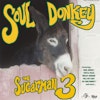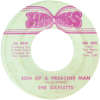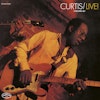My first efforts at hipness began during my senior year of high school. The influence of Jackie Brown-era Samuel L. Jackson had me sporting a Kangol and my dad’s tight leather jacket. Needless to say, I stood out in my lily-white, suburban Kansas environs but I ate it up. I also bull-shitted my way into a record store gig, where I was essentially cashed out in CDs every weekend.
I distinctly remember the spring afternoon in 2000 after having battled it out in the All-State High School Journalism competition (I told you I was happening) and picking up a local alternative weekly on the campus of the University of Kansas. This is where I was first introduced to the Sugarman 3. An enthusiastic review of their recently released funk bomb, Soul Donkey, on Desco Records, had me scrambling to the job to order it from our one-stop.
Bandleader Neal Sugarman’s pursuit of funkiness led him from the suburbs of Boston to New York and New Orleans, picking up the pieces along the way. After attending Berklee College of Music, Sugarman moved to NYC and fell into the local jazz scene. Frustration in the Big Apple led the saxophonist to a temporary stay in New Orleans, where a couple years gigging in funky joints narrowed his intentions: to play toe-tapping, soulful music rather than the esoteric jazz of his peers.
Returning to NYC in the mid-’90s, Sugarman began booking his trio of sax, organ, and drums in lounges throughout the city with soul jazz veteran Rudy Albin, who had spent time behind the kit with Brother Jack McDuff and Papa Lou Donaldson. The Sugarman 3 was born. The group solidified with the addition of organist Adam Scone and guitarist Coleman Mellett (yes, that does make four). It was DJ Frankie Inglese who introduced the group to Gabe Roth and Phillip Lehman of Desco Records in 1998, a local soul and funk label that was pressing hot new 45s from little known vocalists who were soon to blow up, Sharon Jones and Lee Fields. The Sugarman 3 released their first full length album, Sugar’s Boogaloo, that same year.
The response to the album was outstanding and they found themselves busy in the city and abroad. The group’s throwback sound and mod-inspired album artwork had audiences wondering initially if they were a long-lost group who finally found a way to release their soul-drenched stompers. But once the truth was out and the music experienced, listeners were instantly hooked.
In 1999, the Sugarman 3 released their sophomore recording, Soul Donkey, and it hit from the get-go. Recorded at Desco’s 440 Studios in Midtown Manhattan, the ensemble performed a program of original tunes peppered with choice soul and jazz covers.
The Sugarman-penned title track sets the tone immediately with a hard breakbeat thrown down by Albin and a vocal remonstration of just what kind of donkey this song was about. Sugarman’s tart tenor brays before settling into the melody of the Hammond-heavy bluesy funk groove. “Soul Donkey” is just one of those that stays fresh and always makes you move. Scone’s boogaloo strut “Chicken Half” is a burner with the Hammond player front and center. A number of equestrian titled tunes follow, including the breezy guitar led “Pull My Cart,” the swinging “Mulin’ Around,” and steady shaking “Saddle for Two.”
The ensemble finds the pocket on a number of great covers on the album. Ronnie Shannon’s “Baby, I Love You” is played in a lowdown style, while Lou Donaldson’s “Turtle Walk” follows with urgency, as Sugarman’s sax and Mellett’s guitar play off Albin’s stampeding drums and Scone’s organ. James Brown’s “Out of Sight” also gets reworked with choppy organ chords in conversation with Sugarman’s sax.
Soul Donkey was a total gem but also one of the last of Desco’s releases, as the label folded, leaving Sugarman looking for a new home for his next album, Pure Cane Sugar, and for the debut full-length of the one and only Sharon Jones. Rather than shop the albums, Sugarman and Desco pal Gabriel Roth started Daptone Records in 2002, beginning what would be an unbelievable run of original projects and collaborations.
As for me, I moved to New York on the path of the hip in 2002 just in time to catch the album release for Jones’s Dap-Dippin’ at the Mercury Lounge. The Sugarman 3 opened for the soul diva with a sweat-dripping, hip-swinging set and I knew that NYC was just where I was supposed to be.
Wax Poetics found Soul Donkey amidst the thousands of available tracks on Tracklib. These are just some of the many funk tunes that can be found amidst the site’s vast repository of music from all over the world.

THE RECORD STORE FOR SAMPLING:
Tracklib is the world’s first and only sample clearance platform. Their catalog consists of only all-original recordings (nearly 100K songs and counting), ranging from previously unreleased studio sessions by Isaac Hayes to Philly Groove multi-tracks, and from legacy catalogues to rare Hawaiian recordings. All songs can be used for sampling and can be cleared for release instantly, for as little as $50, something that used to take artists months and cost thousands of dollars.


